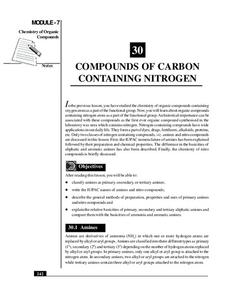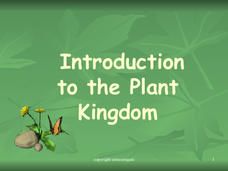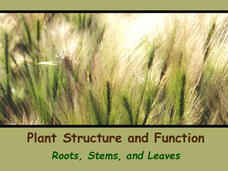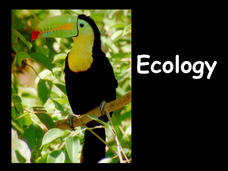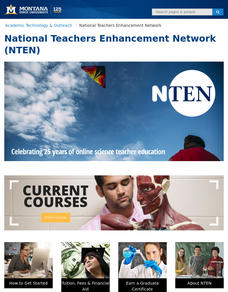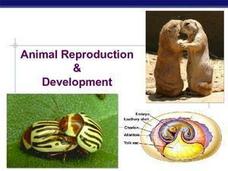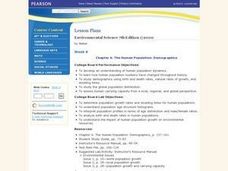National Institute of Open Schooling
Compounds of Carbon Containing Nitrogen
Amines are vital to humans because they help form amino acids, the building blocks of proteins. The 30th lesson in a series of 36 specifically focuses on the organic compounds that contain nitrogen. Learners classify amines and nitro...
National Institute of Open Schooling
p-Block Elements and Their Compounds – I
Lesson 21 in a series of 36 specifically focuses on elements and their compounds from groups 13, 14, and 15 on the periodic table — including boron, carbon, aluminum, silicon, nitrogen, and phosphorus. Classes learn how some of these...
Biology Junction
Introduction to the Plant Kingdom
Plants provide humans with food, shelter, and medications. Scholars gain a better appreciation for plants after learning their functions, divisions, and early ancestors. Each sub-topic includes slides highlighting vocabulary and...
Biology Junction
Plant Structure and Function: Roots, Stems, and Leaves
Scientists found fossils of plants more than 420 million years old—but plants existed for up to 100 million years prior to these fossils. Learn about the importance of plants to the entire planet. Viewing a presentation helps scholars...
Biology Junction
Ecology
Psychologists study human relationships while ecologist study relationships between organisms in the environment. An introduction to ecology and the related vocabulary benefits scholars as they progress through the presentation and...
Curated OER
Bioethics: Debates in Human Genetics
High schoolers, in groups, research and prepare a debate regarding various bioethical situations. After the debates, each student prepares a ortfolio outlining their own personal opinions.
Curated OER
Do Human Practices Affect Water Quality?
Students determine if human practices have any noticeable effects on the quality of stream life as measured by the presence of certain macroinvertebrates. They collect, preserve and identify macroinvertibrate samples and quantify the data.
Curated OER
Africa Puzzle
In this geography activity, students complete a crossword puzzle about Africa. They identify the capitals of various countries located in Africa, the most fertile area, the largest desert, and the longest river. There are 19 questions to...
Curated OER
Whoa! Slow Down-Some of You!
Students analyze demographic data (growth rate, natural increase, fertility rate, crude birth rates, and crude death rates) and determine which areas of the world contain the fastest and slowest growth rates. They construct population...
Curated OER
Animal Reproduction and Development
Details of fertilization, cleavage, the placenta and fetal development are presented, along with important diagrams and illustrations. By using these slides, you and your students will generate discussion points, along with details...
Curated OER
Zebrafish Development
Middle schoolers examine the early development of zebrafish as a model for embryo development in humans. They observe various stages of zebrafish reproduction from sperm and eggs to fertilized eggs and hatchlings.
Curated OER
Reproduction
In this reproduction activity, learners review the processes involved with sexual reproduction in animals and pollination in plants. This activity has 6 fill in the blank, 5 true or false, and 9 short answer questions.
Curated OER
Fertilizers, Pesticides and Health
Pupils apply real data to create and calculate algebraic equations. Students create a visual to represent the concentration for one part per million and apply unit analysis to verify measurement computations. Pupils define the use of a...
Curated OER
Fertile Minds
Learners explore the cultural phenomenon of older mothers. In this current events lesson, students visit selected websites to learn about reproduction, IVF, and cultural changes that have prompted some women to give birth later in life.
Curated OER
Chapter 6: The Human Population: Demographics
Students read the indicated text and complete several suggested labs and activities. They answer critical thinking questions. This lesson plan is very hard to do without the indicated text.
Curated OER
The Human Mind
High schoolers read and discuss twin studies to explore the debate of nature vs. nurture. They create a list of characteristics and then look for evidence of whether it is primarily a genetic or environmental characteristic. All of the...
Curated OER
Human Ecology: How it Relates to Population
Ninth graders are introduced to the concept of population. In groups, they research the problems associated with overpopulation and underpopulation. They practice calculating birth and death rates and discus how they can be used to...
Population Connection
A Demographically Divided World
Did you know that birth and life rates vary across the world? The resource, the second in a six-part series, discusses just how demographics differ across countries and why it might be the case. Scholars complete worksheets, watch...
Population Connection
Where Do We Grow from Here?
Did you know that the population is expected to grow to 11 billion by 2100? The resource serves final installment in a six-part series on the global population and its effects. Scholars interpret data from the United Nations about the...
K12 Reader
Summarize It: President Theodore Roosevelt's 7th Annual Message to Congress
How did Theodore Roosevelt stress the importance of conservation during his time as president of the United States? Take a closer look at the language Roosevelt used himself in a 1907 address to Congress, and have your young historians...
It's About Time
The Nitrogen and Phosphorous Cycles
How do we affect the ecosystem, and what can we do to preserve it? Pupils explore chemicals that promote and inhibit plant growth, then discuss the importance of nitrogen and phosphorus to the survival of organisms and describe how...
Curated OER
Four Ancient River Civilizations
Students explore how the environment shapes man, how man transformed his world, nd how art became part of the human process. The group is divided into clans and their migratory routes developed in the eight lessons of this unit.
Curated OER
Pollution and Marine Life
In this pollution and marine life worksheet, students use 9 given terms related to types of pollution and ocean food chains to complete sentences. Students number the effects of human sewage and soil runoff that harm ocean organisms in...
Curated OER
Pea Soup Ponds
Students perform an experiment where they learn how water can be polluted by algal bloom. They grow algae with different concentrations of fertilizers or nutrients and analyze their results.


